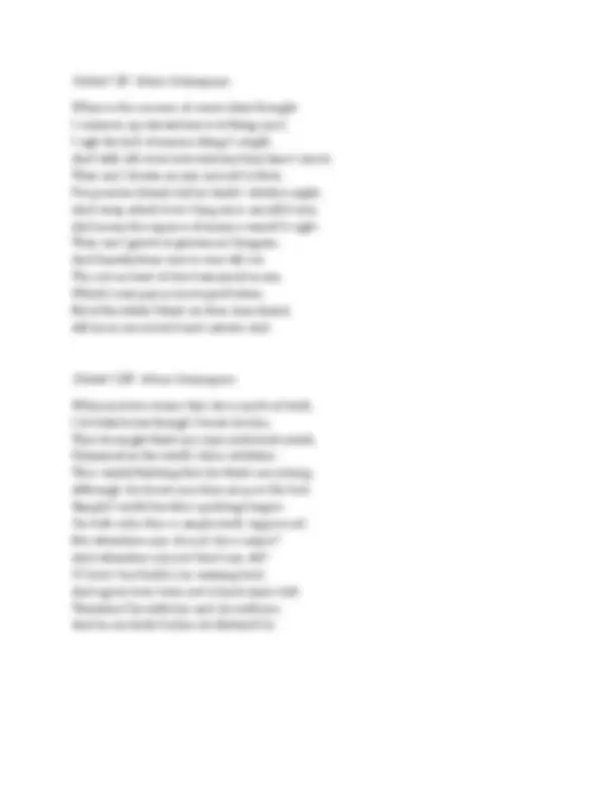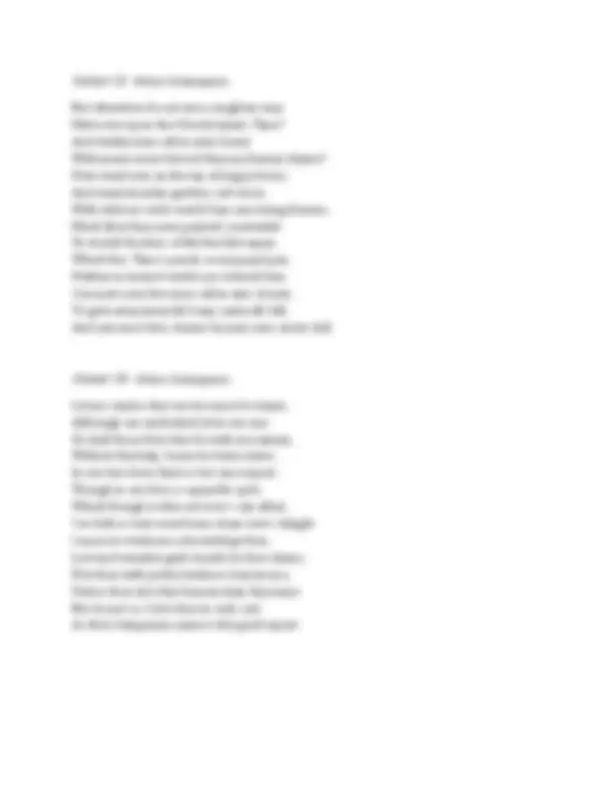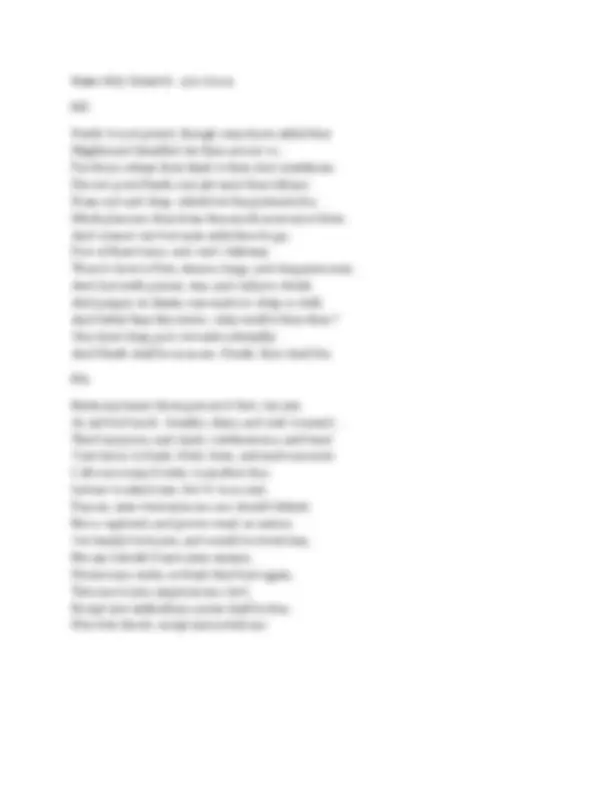





Study with the several resources on Docsity

Earn points by helping other students or get them with a premium plan


Prepare for your exams
Study with the several resources on Docsity

Earn points to download
Earn points by helping other students or get them with a premium plan
Community
Ask the community for help and clear up your study doubts
Discover the best universities in your country according to Docsity users
Free resources
Download our free guides on studying techniques, anxiety management strategies, and thesis advice from Docsity tutors
An in-depth analysis of the sonnet, a 14-line poetic form with two distinct variations: the Italian (Petrarchan) and the Shakespearean. Learn about the structure, rhyme schemes, and characteristics of each type, as well as examples from famous poets like John Keats, William Wordsworth, and William Shakespeare.
What you will learn
Typology: Schemes and Mind Maps
1 / 5

This page cannot be seen from the preview
Don't miss anything!




Sonnet: is a 14 line poem. There are two kinds of sonnets: Italian (Petrarchan) OR Shakespearean ITALIAN - 2 parts - an octet and sestet
On Grasshopper and Cricket - John Keats The poetry of earth is never dead: When all the birds are faint with the hot sun, And hide in cooling trees, a voice will run From hedge to hedge about the new-mown mead; That is the Grasshopper's--he takes the lead
In summer luxury,--he has never done With his delights; for when tired out with fun He rests at ease beneath some pleasant weed. The poetry of earth is ceasing never: On a lone winter evening, when the frost Has wrought a silence, from the stove there shrills The Cricket's song, in warmth increasing ever, And seems to one in drowsiness half lost, The Grasshopper's among some grassy hills. It is a Beauteous Evening - William Wordsworth 1 It is a beauteous evening, calm and free, 2The holy time is quiet as a Nun 3Breathless with adoration; the broad sun 4Is sinking down in its tranquility; 5The gentleness of heaven broods o'er the Sea; 6Listen! the mighty Being is awake, 7And doth with his eternal motion make 8A sound like thunder--everlastingly. 9Dear child! dear Girl! that walkest with me here, 10If thou appear untouched by solemn thought, 11Thy nature is not therefore less divine: 12 Thou liest in Abraham's bosom all the year; 13And worshipp'st at the Temple's inner shrine, 14God being with thee when we know it not.
Sonnet 16 - William Shakespeare But wherefore do not you a mightier way Make war upon this bloody tyrant, Time? And fortify your self in your decay With means more blessed than my barren rhyme? Now stand you on the top of happy hours, And many maiden gardens, yet unset, With virtuous wish would bear you living flowers, Much liker than your painted counterfeit: So should the lines of life that life repair, Which this, Time's pencil, or my pupil pen, Neither in inward worth nor outward fair, Can make you live your self in eyes of men. To give away yourself, keeps yourself still, And you must live, drawn by your own sweet skill. Sonnet 36 - William Shakespeare Let me confess that we two must be twain, Although our undivided loves are one: So shall those blots that do with me remain, Without thy help, by me be borne alone. In our two loves there is but one respect, Though in our lives a separable spite, Which though it alter not love's sole effect, Yet doth it steal sweet hours from love's delight. I may not evermore acknowledge thee, Lest my bewailed guilt should do thee shame, Nor thou with public kindness honour me, Unless thou take that honour from thy name: But do not so, I love thee in such sort, As thou being mine, mine is thy good report.
From Holy Sonnets - John Donne
Death, be not proud, though some have called thee Mighty and dreadful, for thou art not so ; For those, whom thou think'st thou dost overthrow, Die not, poor Death, nor yet canst thou kill me. From rest and sleep, which but thy picture[s] be, Much pleasure, then from thee much more must flow, And soonest our best men with thee do go, Rest of their bones, and soul's delivery. Thou'rt slave to Fate, chance, kings, and desperate men, And dost with poison, war, and sickness dwell, And poppy, or charms can make us sleep as well, And better than thy stroke ; why swell'st thou then? One short sleep past, we wake eternally, And Death shall be no more ; Death, thou shalt die.
Batter my heart, three-person'd God ; for you As yet but knock ; breathe, shine, and seek to mend ; That I may rise, and stand, o'erthrow me, and bend Your force, to break, blow, burn, and make me new. I, like an usurp'd town, to another due, Labour to admit you, but O, to no end. Reason, your viceroy in me, me should defend, But is captived, and proves weak or untrue. Yet dearly I love you, and would be loved fain, But am betroth'd unto your enemy ; Divorce me, untie, or break that knot again, Take me to you, imprison me, for I, Except you enthrall me, never shall be free, Nor ever chaste, except you ravish me.